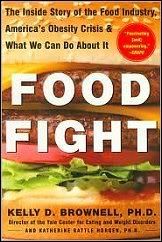 In FOOD FIGHT, Brownell and Horgen explore the obesity crisis in the United States. They discuss the epidemic’s possible causes, its contribution to poor health, the toxic environment, the persuasion of food and soda companies, and most importantly the solutions.
In FOOD FIGHT, Brownell and Horgen explore the obesity crisis in the United States. They discuss the epidemic’s possible causes, its contribution to poor health, the toxic environment, the persuasion of food and soda companies, and most importantly the solutions.The book primarily focuses on problems in the United States, but dedicates almost a whole chapter to explaining how obesity has become a worldwide problem. As Canadians, we are not exempt from this epidemic. We are second only to the U.S. for obesity rates and many of the problems occurring in the U.S. are also applicable in Canada.
Why are North Americans fat? The answer is simple. The average person consumes more calories than their body needs and rarely exercises. If that person were to limit their caloric intake to a healthy amount and exercise for thirty minutes a day, weight would be maintained.
If only the obesity problem was that simple. Placing responsibility solely on the individual ignores all outside factors. Food Fight explains how Americans are living in “The Toxic Environment”. Obesity is almost inevitable due to environment.
People eat junk food because it is fast, cheap, and tastes good. Junk food is available twenty four hours a day. Soda and food portions have dramatically increased in size. Processed food is cheaper than healthy food such as fruits and vegetables, which are more expensive and harder to find. Eating poorly is simply easier than eating healthy.
Exercising is also more difficult. Instead of walking or biking people are driving. In many cities t is dangerous for people to walk or bike because roads are unsafe. A lack of crosswalks, sidewalks, bicycle only lanes, and properly paved roads are major issues.
Food companies are a huge part of the obesity epidemic. These corporations are making millions selling products with high fat and sugar contents. They say their products can be part of a healthy lifestyle and there are no links between fast food or soda and obesity. Studies have proved otherwise. Corporations claim they give people choice, but people cannot make the right choices if healthy foods are not available.
Coke and Pepsi urge educators to put soda machines in schools in exchange for thousands of dollars. However, they are earning millions in profits. The government should be investing in education. Schools shouldn't have to depend on soda companies for money.
Overall, the writing becomes repetitive at times, but this can be overlooked. Arguments are backed up with multiple facts and research. The book brings up important issues like advertising to children, soda in schools, environmental and economic factors of obesity, the hypocrisy of food companies, and the government's role. After every problem a solution is given. Change is emphasized and encouraged. The authors make the reader feel like change is possible; that the food fight could be won.
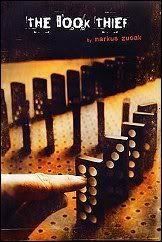 Although it is listed as a young adult novel, THE BOOK THIEF is a story that both teens and adults will find captivating and heartbreaking.
Although it is listed as a young adult novel, THE BOOK THIEF is a story that both teens and adults will find captivating and heartbreaking.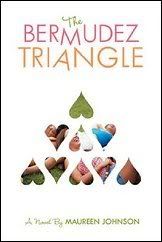 The Bermudez Triangle was the last of Maureen Johnson's five books that I read. I wish it had been the first, especially after it was
The Bermudez Triangle was the last of Maureen Johnson's five books that I read. I wish it had been the first, especially after it was 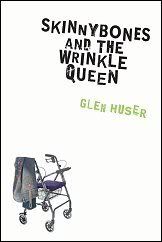 At 15, Tamara has survived the foster care system through brains, will, and attitude. Now close to getting out, she dreams of being a model. First, though, there’s high school to get through, along with her teacher’s latest community project — volunteering at the local seniors home. Tamara doubts she can endure either the residents or the smells.
At 15, Tamara has survived the foster care system through brains, will, and attitude. Now close to getting out, she dreams of being a model. First, though, there’s high school to get through, along with her teacher’s latest community project — volunteering at the local seniors home. Tamara doubts she can endure either the residents or the smells.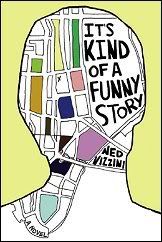 IT'S KIND OF A FUNNY STORY is by far the most accurate portrayal of depression I have ever read. This is not surprising, considering the story is based off of Ned Vizzini's own experience with depression. In 2004, he spent five days in the adult psychiatric ward of Methodist Hospital.
IT'S KIND OF A FUNNY STORY is by far the most accurate portrayal of depression I have ever read. This is not surprising, considering the story is based off of Ned Vizzini's own experience with depression. In 2004, he spent five days in the adult psychiatric ward of Methodist Hospital.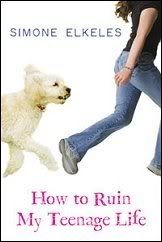 I'm feeling a little tired today. Why? Because I reading HOW TO RUIN MY TEENAGE LIFE by Simone Elkeles. This book mesmerized me and kept me turning the pages well into the wee hours of the morning.
I'm feeling a little tired today. Why? Because I reading HOW TO RUIN MY TEENAGE LIFE by Simone Elkeles. This book mesmerized me and kept me turning the pages well into the wee hours of the morning.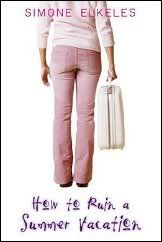 Sixteen-year-old Amy Nelson is looking forward to her summer vacation until her absent father calls with news her grandmother in Israel is sick. He sends Amy a plane ticket and in no time she has left her priviledged American life behind to discover another culture.
Sixteen-year-old Amy Nelson is looking forward to her summer vacation until her absent father calls with news her grandmother in Israel is sick. He sends Amy a plane ticket and in no time she has left her priviledged American life behind to discover another culture.